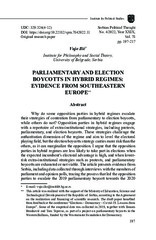Parliamentary and Election Boycotts in Hybrid Regimes: Evidence from Southeastern Europe
Чланак у часопису (Објављена верзија)
 ,
, Institute for Political Studies
Метаподаци
Приказ свих података о документуАпстракт
Why do some opposition parties in hybrid regimes escalate their strategies of contention from parliamentary to election boycotts, while others do not? Opposition parties in hybrid regimes engage with a repertoire of extra-institutional strategies, including protests, parliamentary, and election boycotts. These strategies challenge the authoritarian dimension of the regime and aim to level the electoral playing field, but the election boycott strategy carries more risk than the others, as it can marginalize the opposition. I argue that the opposition parties in hybrid regimes are less likely to take part in elections when the expected incumbent’s electoral advantage is high, and when lower-risk extra-institutional strategies such as protests, and parliamentary boycotts are exhausted or not viable. The article presents evidence from Serbia, including data collected through interviews with the members of parliament and opinion polls, tracing the process that led the opposition parties to ...escalate the 2019 parliamentary boycott towards the 2020 boycott of the elections, despite being aware of the likely adverse effects. I also conduct a comparative analysis of opposition parties in similar contexts of North Macedonia, Montenegro, and Albania that boycotted the parliament but always took part in the elections. The article brings together the detached literature on parliamentary and electoral boycotts and contributes to a better understanding of opposition strategies in hybrid regimes.
Кључне речи:
political parties / opposition / election boycott / parliamentary boycott / hybrid regime / Serbia / BalkansИзвор:
Serbian Political Thought, 2022, 78, 4, 197-217Издавач:
- Institute for Political Studies
Финансирање / пројекти:
- 451-03-68/2022-14/200025
Колекције
Институција/група
IFDTTY - JOUR AU - Ilić, Vujo PY - 2022 UR - http://rifdt.instifdt.bg.ac.rs/123456789/2697 AB - Why do some opposition parties in hybrid regimes escalate their strategies of contention from parliamentary to election boycotts, while others do not? Opposition parties in hybrid regimes engage with a repertoire of extra-institutional strategies, including protests, parliamentary, and election boycotts. These strategies challenge the authoritarian dimension of the regime and aim to level the electoral playing field, but the election boycott strategy carries more risk than the others, as it can marginalize the opposition. I argue that the opposition parties in hybrid regimes are less likely to take part in elections when the expected incumbent’s electoral advantage is high, and when lower-risk extra-institutional strategies such as protests, and parliamentary boycotts are exhausted or not viable. The article presents evidence from Serbia, including data collected through interviews with the members of parliament and opinion polls, tracing the process that led the opposition parties to escalate the 2019 parliamentary boycott towards the 2020 boycott of the elections, despite being aware of the likely adverse effects. I also conduct a comparative analysis of opposition parties in similar contexts of North Macedonia, Montenegro, and Albania that boycotted the parliament but always took part in the elections. The article brings together the detached literature on parliamentary and electoral boycotts and contributes to a better understanding of opposition strategies in hybrid regimes. PB - Institute for Political Studies T2 - Serbian Political Thought T1 - Parliamentary and Election Boycotts in Hybrid Regimes: Evidence from Southeastern Europe IS - 4 VL - 78 SP - 197 EP - 217 DO - 10.22182/spm.7842022.11 ER -
@article{
author = "Ilić, Vujo",
year = "2022",
abstract = "Why do some opposition parties in hybrid regimes escalate their strategies of contention from parliamentary to election boycotts, while others do not? Opposition parties in hybrid regimes engage with a repertoire of extra-institutional strategies, including protests, parliamentary, and election boycotts. These strategies challenge the authoritarian dimension of the regime and aim to level the electoral playing field, but the election boycott strategy carries more risk than the others, as it can marginalize the opposition. I argue that the opposition parties in hybrid regimes are less likely to take part in elections when the expected incumbent’s electoral advantage is high, and when lower-risk extra-institutional strategies such as protests, and parliamentary boycotts are exhausted or not viable. The article presents evidence from Serbia, including data collected through interviews with the members of parliament and opinion polls, tracing the process that led the opposition parties to escalate the 2019 parliamentary boycott towards the 2020 boycott of the elections, despite being aware of the likely adverse effects. I also conduct a comparative analysis of opposition parties in similar contexts of North Macedonia, Montenegro, and Albania that boycotted the parliament but always took part in the elections. The article brings together the detached literature on parliamentary and electoral boycotts and contributes to a better understanding of opposition strategies in hybrid regimes.",
publisher = "Institute for Political Studies",
journal = "Serbian Political Thought",
title = "Parliamentary and Election Boycotts in Hybrid Regimes: Evidence from Southeastern Europe",
number = "4",
volume = "78",
pages = "197-217",
doi = "10.22182/spm.7842022.11"
}
Ilić, V.. (2022). Parliamentary and Election Boycotts in Hybrid Regimes: Evidence from Southeastern Europe. in Serbian Political Thought Institute for Political Studies., 78(4), 197-217. https://doi.org/10.22182/spm.7842022.11
Ilić V. Parliamentary and Election Boycotts in Hybrid Regimes: Evidence from Southeastern Europe. in Serbian Political Thought. 2022;78(4):197-217. doi:10.22182/spm.7842022.11 .
Ilić, Vujo, "Parliamentary and Election Boycotts in Hybrid Regimes: Evidence from Southeastern Europe" in Serbian Political Thought, 78, no. 4 (2022):197-217, https://doi.org/10.22182/spm.7842022.11 . .


